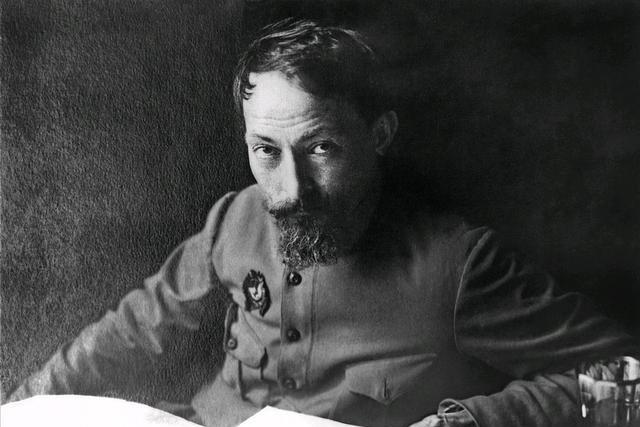When people think of the October Revolution, they first think of the shining names of Lenin, Trotsky, and so on. However, there was one man who played a crucial role before and after the outbreak of the October Revolution: Dzerzhinsky, the "father of the Cheka."
According to the records, Dzerzhinski was born into a noble family in Poland, and he lived well from an early age. If it were not for the war, perhaps Dzerzhinsky would probably have become a good priest in the future. But the reality is always so bizarre, and it is indeed strange that Dzerzhinsky, who was regarded as the hope of the family since childhood, has embarked on the road of revolution.

In 1896, under the influence of Marxist doctrine, Dzerzhinsky dropped out of the Verno Secondary School and embarked on the path of a professional revolutionary. During this period, Dzerzhinsky also made a group of like-minded friends, including Lenin, Trotsky, and stalin.
It is no exaggeration to say that Dzerzhinsky lived an almost ascetic life during the revolution. Repeated arrests and exiles made Dzerzhinsky more and more resilient. For the sake of the revolution, he even abandoned his family and business, gave up the good life at home, and unswervingly struggled for the ideal in his heart.
On December 20, 1917, in order to deal with the reactionary forces in Soviet Russia and abroad, the Central Committee of the Soviet Union decided to establish the "All-Russian Purge Committee" (Cheka), chaired by Dzerzhinsky.
At the beginning of the establishment of the Cheka, its work was subject to the supervision of the Judicial People's Committee and the People's Committee of the Interior, and the issuance of arrest warrants must be signed by the Judicial People's Commissars to take effect. However, as the revolutionary situation became more severe, the Soviets, under pressure, began to loosen restrictions and give the Cheka the power to arrest criminals without trial.
Of course, the Cheka has been the sword and shield of the Soviets since its birth. Although Dzerzhinsky seemed to be a weak scholar, he was not soft on the enemy, and coupled with the fact that he had the most elite troops in Soviet Russia, it was naturally impossible to have no blood in his hands. Because of this, the Cheka has long been seen as the face of violent institutions.
In fact, there is a clear understanding of the basic function of the Cheka, Dzerzhinsky himself. He once said frankly: "We represent self-organized terrorism, and this sentence must be made clear first." "How frank, how decisive, that even Himmler would not dare to say such a thing.
As Dzerzhinsky said, the Cheka has always insisted on using terror against terror. In times of turmoil, the young people never thank anyone for their magnanimity, nor do they care about the constraints of the law, only an iron fist can win victory. In this regard, the Cheka did play an irreplaceable role during the consolidation of Soviet power.
However, as the supreme leader of the Cheka, Dzerzhinsky never engaged in dictatorship or cruelty. On the contrary, he was a staunch Marxist, and his self-control, kindness, and benevolence are still praised today.
Many of his comrades-in-arms of the October Revolution had this to say of Dzerzhinsky: "He only needed three things to live: work, bread, and water. Indeed, in the eyes of the people, Dzerzhinsky never watched movies or attended dances, he did not even have a home, only an office, and the will became almost his only insistence. His deep, sunken eyes were forever shining with faith, which was one of the reasons he had been able to do high-intensity work for a long time.
Although he fought politically all his life, Dzerzhinsky has long presented himself as a state activist. Beginning in 1924 as Chairman of the Supreme Council of the National Economy of the USSR, Dzerzhinsky revealed his true political leanings. He firmly supported the New Economic Policy and opposed the state's monopoly of economic trade.
Dzerzhinsky was even more adamantly opposed to the collectivization of agriculture advocated by Stalin and others, believing that radical economic policies would bring misfortune to the Soviet peasantry. If Dzerzhinsky had lived a few more years, he would most likely have been branded as a "rightist" like Bukharin and others. Of course, this is also a later story.
From another point of view, Dzerzhinsky's comrades-in-arms never regarded him as a builder of the national economy. They all just wanted to borrow Dzerzhinsky's men in black and thunder to wage political struggles, including Lenin. When the "Gebiu" developed by the Cheka penetrated into all corners of Soviet society, even Dzerzhinsky became a microcosm of the instrumentation of the Cheka, which was Dzerzhinsky's sadness.
Dzerzhinsky is not a murderer, he simply wants to turn his political ideals into reality. But, like the Bolsheviks of his time, he considered terror to be only a "necessary political means" and that everything was worth it in order to achieve the aims of the revolution. This may be the reason why Dzerzhinsky fell into the Cheka quagmire!
Fortunately, Dzerzhinsky, the "father of the Cheka", eventually died of illness before the party struggle escalated, thus preserving his honor as "Iron Felix". If this revolutionary saint had lived to be in 1937, he would not have been awaited by flowers and honors!